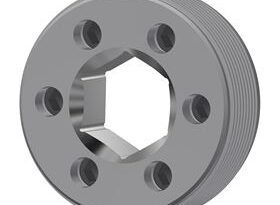the benefits of using magnetically coupled pumps
Magnetically coupled pumps operate based on the principle of magnetic coupling, which eliminates the need for direct mechanical seals between the pump and the motor. This design leverages the interaction between two magnets—one attached to the motor and the other to the pump rotor—to transfer torque across a sealed barrier. The absence of a physical connection minimizes leakage risks and enhances overall system reliability.
Key Features of Magnetically Coupled Pumps:
- Sealed Operation: The magnetic coupling ensures that the pumping fluid remains contained within the system, preventing contamination and reducing maintenance requirements.
- Torque Transfer: Magnets provide efficient torque transfer from the motor to the pump rotor, enabling smooth and consistent operation even in challenging environments.
- Flexibility in Alignment: The magnetic linkage allows for some degree of misalignment between the motor and pump shafts, which can accommodate vibrations and reduce mechanical stress.
The operational efficiency of magnetically coupled pumps is further enhanced by their ability to handle corrosive and abrasive fluids without degrading the coupling mechanism. This makes them ideal for applications in industries such as chemical processing, wastewater treatment, and food and beverage manufacturing.
Additionally, the design inherently reduces mechanical wear and tear, as there are no direct contact points subjected to friction. The resulting longevity contributes to lower lifecycle costs and increased reliability. To illustrate the operational differences, consider the following comparison:
| Aspect | Magnetically Coupled Pumps | Traditional Pumps |
|---|---|---|
| Sealing Mechanism | Magnetic coupling eliminates the need for seals | Requires mechanical seals, prone to leakage |
| Maintenance Needs | Lower maintenance due to sealed operation | Higher maintenance to service seals and prevent leaks |
| Alignment Tolerance | Greater tolerance for misalignment | Requires precise alignment to prevent wear |
These operational advantages highlight the benefits of using magnetically coupled pumps, particularly in environments where reliability and minimal maintenance are critical. The ability to maintain sealed conditions without compromising performance underscores the innovative nature of this pump technology.
energy efficiency advantages
Magnetically coupled pumps offer significant energy efficiency advantages over traditional pumping systems. The innovative design minimizes energy loss through several mechanisms, enhancing overall performance and reducing operational costs.
One of the primary factors contributing to the energy efficiency of magnetically coupled pumps is the elimination of mechanical seals. Traditional pumps rely on seals to prevent leakage, which often leads to increased friction and energy consumption. In contrast, the magnetic coupling provides a direct and efficient transfer of torque from the motor to the pump without physical contact, resulting in lower energy losses.
Additionally, the precise alignment capabilities of magnetically coupled pumps ensure optimal performance. The inherent flexibility in the magnetic linkage accommodates slight misalignments and vibrations, maintaining consistent energy transfer and reducing the need for energy-intensive corrective measures. This adaptability not only preserves energy but also extends the lifespan of the pump components.
The ability to operate at variable speeds further enhances the energy efficiency of magnetically coupled pumps. These pumps can easily adjust their operational speed to match the demand, avoiding unnecessary energy consumption during periods of low demand. This dynamic responsiveness is particularly beneficial in applications where fluid demand fluctuates, such as in HVAC systems or process industries.
To illustrate the energy efficiency benefits, consider the following comparison:
| Aspect | Magnetically Coupled Pumps | Traditional Pumps |
|---|---|---|
| Energy Loss from Sealing | Minimal due to magnetic coupling | Higher due to mechanical seal friction |
| Torque Transfer Efficiency | High, with direct magnetic interaction | Lower, with energy lost in seal maintenance |
| Operational Flexibility | Supports variable speed operations efficiently | Less efficient in variable speed adjustments |
Furthermore, magnetically coupled pumps often feature advanced motor controls that optimize energy usage based on real-time operational data. These controls can adjust the motor’s power input to match the exact requirements of the pumping task, ensuring that energy is not wasted on unnecessary power consumption.
- Reduced Friction: The lack of direct contact between moving parts decreases friction, leading to lower energy usage.
- Improved Torque Efficiency: Magnetic coupling ensures that energy is effectively transferred, minimizing losses.
- Dynamic Speed Adjustment: Ability to modulate pump speed in response to demand, enhancing energy savings.
- Enhanced Motor Performance: Optimized motor operations contribute to overall energy efficiency.
The cumulative effect of these features results in magnetically coupled pumps delivering superior energy efficiency, which not only lowers operational expenses but also contributes to more sustainable and environmentally friendly pumping solutions. By reducing energy consumption and minimizing waste, these pumps support both economic and ecological goals in various industrial applications.
maintenance benefits
Magnetically coupled pumps offer significant maintenance benefits compared to traditional pump systems. The innovative design minimizes the number of components exposed to the operating environment, thereby reducing the frequency and complexity of maintenance tasks required to keep the system running efficiently.
One of the primary maintenance advantages is the elimination of mechanical seals. Traditional pumps rely on seals to prevent fluid leakage, which are often wear-prone and require regular inspection and replacement. In contrast, the magnetic coupling in these pumps ensures a sealed operation, virtually eliminating the need for seal maintenance. This not only reduces the downtime associated with seal replacements but also lowers the overall maintenance costs.
Additionally, the absence of a direct mechanical connection between the motor and the pump rotor means there are fewer parts subject to mechanical wear and tear. This results in longer intervals between maintenance activities and extends the lifespan of critical components. The simplified design also makes it easier to access and service other parts of the pump when necessary, further streamlining maintenance procedures.
To illustrate the maintenance benefits, consider the following comparison:
| Aspect | Magnetically Coupled Pumps | Traditional Pumps |
|---|---|---|
| Seal Maintenance | Minimal to none due to magnetic coupling | Frequent inspections and replacements required |
| Component Wear | Reduced wear with fewer exposed parts | Higher wear due to direct mechanical connections |
| Maintenance Frequency | Less frequent due to robust design | More frequent maintenance needed |
| Downtime | Lower, as maintenance tasks are simpler and quicker | Higher, due to complex maintenance procedures |
Furthermore, magnetically coupled pumps often incorporate advanced monitoring systems that can predict maintenance needs before issues arise. These predictive maintenance features leverage real-time data to assess the condition of the pump, allowing for proactive maintenance scheduling. This approach not only prevents unexpected failures but also optimizes maintenance resources by addressing issues before they escalate.
- Reduced Downtime: With fewer parts to service and simpler maintenance procedures, pumps experience less downtime, ensuring continuous operation.
- Lower Maintenance Costs: Fewer components requiring regular maintenance translates to significant cost savings over the pump’s lifecycle.
- Extended Component Lifespan: The sealed and protected environment minimizes wear, extending the life of both the pump and motor.
- Simplified Maintenance Procedures: The design facilitates easier access to necessary components, allowing for quicker and more efficient maintenance tasks.
The combination of these maintenance benefits makes magnetically coupled pumps an attractive option for industries where reliability and minimal maintenance are paramount. By reducing the need for frequent maintenance and lowering associated costs, these pumps enhance operational efficiency and contribute to overall system sustainability.
safety improvements
 Magnetically coupled pumps significantly enhance operational safety through their unique design and inherent features. By eliminating direct mechanical seals, these pumps reduce the potential for fluid leaks, which is crucial when handling hazardous, flammable, or toxic substances. This sealed operation ensures that dangerous fluids remain contained within the system, minimizing the risk of accidental exposure or environmental contamination.
Magnetically coupled pumps significantly enhance operational safety through their unique design and inherent features. By eliminating direct mechanical seals, these pumps reduce the potential for fluid leaks, which is crucial when handling hazardous, flammable, or toxic substances. This sealed operation ensures that dangerous fluids remain contained within the system, minimizing the risk of accidental exposure or environmental contamination.
One of the key safety benefits is the reduction of explosion hazards. In traditional pump systems, mechanical seals can be points of weakness where leaks occur, potentially leading to flammable vapor accumulation. Magnetically coupled pumps mitigate this risk by maintaining a continuous barrier between the motor and the pumping fluid. This design choice is especially advantageous in industries such as chemical processing, oil and gas, and pharmaceuticals, where safety standards are stringent.
Furthermore, the absence of exposed moving parts on the motor side enhances workplace safety. Traditional pumps often have accessible components that can pose injury risks to operators. In contrast, magnetically coupled pumps confine all moving elements within the sealed environment, reducing the likelihood of accidental contact and enhancing overall site safety.
To illustrate the safety improvements, consider the following comparison:
| Aspect | Magnetically Coupled Pumps | Traditional Pumps |
|---|---|---|
| Leakage Risk | Significantly reduced due to sealed magnetic coupling | Higher risk from mechanical seals and potential leaks |
| Explosion Hazard | Lower risk as there are no leaks to ignite flammable vapors | Increased risk due to possible vapor accumulation from leaks |
| Operator Safety | Fewer exposed moving parts, reducing injury risks | More exposed components that can be hazardous |
| Environmental Protection | Enhanced containment of fluids, preventing spills | Greater potential for spills and environmental contamination |
In addition to preventing leaks and reducing explosion hazards, magnetically coupled pumps often incorporate advanced monitoring systems that enhance safety. These systems can detect abnormal operating conditions, such as excessive vibrations or temperature fluctuations, and automatically shut down the pump to prevent accidents. This proactive approach ensures that potential safety issues are addressed before they escalate into serious incidents.
- Enhanced Containment: The sealed design ensures that hazardous fluids are securely contained, preventing accidental releases.
- Intrinsic Safety: Reduced risk of ignition sources in environments with flammable or explosive materials.
- Automated Safety Features: Advanced monitoring and control systems provide real-time safety oversight and automatic shutdown capabilities.
- Robust Construction: Durable materials and engineering reduce the likelihood of mechanical failures that could compromise safety.
Moreover, magnetically coupled pumps contribute to safer maintenance practices. Since there are no mechanical seals to replace, maintenance personnel are less likely to encounter hazardous fluids during servicing. This not only protects workers from exposure but also streamlines maintenance procedures, allowing for safer and more efficient operations.
The integration of these safety features makes magnetically coupled pumps a superior choice for applications where safety is a paramount concern. By addressing potential hazards associated with traditional pump systems, these pumps provide a more secure and reliable solution for handling a wide range of fluids in various industrial settings.
application versatility
Magnetically coupled pumps demonstrate remarkable flexibility in their applications, making them suitable for a wide array of industries and processes. This versatility is primarily driven by their unique design, which allows them to handle diverse fluids and operate effectively under varying conditions. The adaptability of these pumps ensures that they can meet the specific needs of different sectors, enhancing operational efficiency and reliability.
Industries Benefiting from Magnetically Coupled Pumps
- Chemical Processing: Able to handle corrosive and aggressive chemicals without compromising the pump’s integrity, ensuring safe and efficient processing.
- Pharmaceuticals: Provide sanitary and contamination-free pumping solutions essential for maintaining product purity and adhering to strict regulatory standards.
- Food and Beverage: Facilitate the movement of viscous and temperature-sensitive fluids while maintaining hygiene standards.
- Wastewater Treatment: Efficiently manage the transfer of sludge and other wastewater components, contributing to effective treatment processes.
- Oil and Gas: Suitable for handling crude oil and other petroleum products, offering reliable performance in demanding environments.
- HVAC Systems: Support heating, ventilation, and air conditioning applications with energy-efficient and quiet operation.
- Marine Applications: Provide dependable pumping solutions for ballast systems and other onboard fluid transfers, resistant to harsh marine conditions.
Versatile Fluid Handling Capabilities
Magnetically coupled pumps are engineered to manage a broad range of fluids, including:
- Viscous Fluids: Capable of pumping thick and sticky substances without loss of efficiency.
- Corrosive Liquids: Resistant materials and sealed designs prevent corrosion, ensuring longevity and reliability.
- Abrasive Fluids: Durable construction minimizes wear and tear when handling abrasive materials.
- Temperature-Sensitive Fluids: Maintain optimal performance even with fluids that require precise temperature control.
- Hazardous Chemicals: Enhanced safety features allow for the secure handling of toxic and flammable substances.
Adaptability to Various Operating Conditions
The design of magnetically coupled pumps allows them to perform reliably under a multitude of operating conditions, such as:
| Condition | Magnetically Coupled Pumps | Traditional Pumps |
|---|---|---|
| High Vibration Environments | Magnetic coupling absorbs vibrations, reducing stress on components | Direct mechanical connections amplify vibrations, leading to increased wear |
| Extreme Temperatures | Materials and seals are selected for high and low-temperature resilience | Seals and mechanical parts may degrade under extreme temperatures |
| Variable Pressures | Efficient torque transfer accommodates pressure fluctuations | Pressure changes can cause leakage and mechanical stress |
| Remote Locations | Reliable operation with minimal maintenance requirements | Higher maintenance needs can be challenging in remote settings |
Customized Solutions for Specific Needs
Magnetically coupled pumps can be tailored to meet the unique requirements of different applications through various customization options:
- Material Selection: Pumps can be constructed from stainless steel, PVC, or other materials to match the chemical compatibility needs of the application.
- Size and Capacity: Available in a wide range of sizes and flow capacities, allowing for precise matching to the system requirements.
- Control Systems: Advanced control options enable integration with existing automation systems for enhanced process management.
- Mounting Configurations: Flexible mounting options accommodate different installation environments and spatial constraints.
Economic and Environmental Adaptability
The flexibility of magnetically coupled pumps also extends to economic and environmental considerations:
- Cost-Effective Operations: Energy-efficient design reduces operational costs, making them a financially viable option for long-term use.
- Energy Savings: Optimized performance minimizes energy consumption, supporting sustainable practices.
- Reduced Environmental Impact: Sealed operation prevents leaks and spills, mitigating environmental risks and ensuring compliance with regulatory standards.
- Scalability: Suitable for both small-scale and large-scale operations, allowing businesses to scale their pumping solutions as needed.
The broad application range of magnetically coupled pumps underscores their significance in modern industrial operations. Their ability to adapt to various fluids, operating conditions, and specific industry requirements makes them a highly valuable component in enhancing process efficiency and reliability across multiple sectors.




